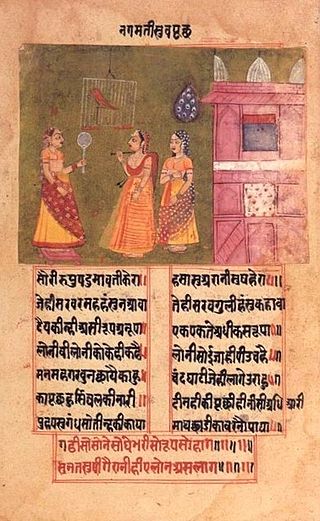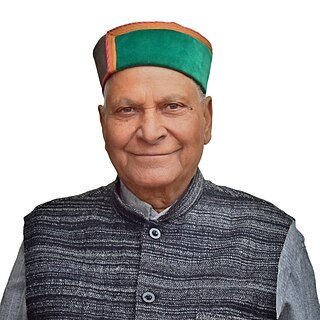Kishori Lal may refer to:
- Pandit Kishori Lal , 1912–1990, Indian freedom fighter
- Kishori Lal (Baijnath politician)
- Kishori Lal (Kullu politician)
Kishori Lal may refer to:

Sikandar Khan Lodi, born Nizam Khan, was an Afghan or a Turco-Afghan Sultan of the Delhi Sultanate between 1489 and 1517. He became ruler of the Lodi dynasty after the death of his father Bahlul Khan Lodi in July 1489. The second and most successful ruler of the Lodi dynasty of the Delhi sultanate, he was also a poet of the Persian language and prepared a diwan of 9000 verses. He made an effort to recover the lost territories which once were a part of the Delhi Sultanate and was able to expand the territory controlled by the Lodi Dynasty.

Malik Kafur, also known as Taj al-Din Izz al-Dawla, was a prominent slave-general of the Delhi Sultanate ruler Alauddin Khalji. He was captured by Alauddin's general Nusrat Khan during the 1299 invasion of Gujarat, and rose to prominence in the 1300s.
Hizabruddin, better known by his title Zafar Khan, was a general of the Delhi Sultanate ruler Alauddin Khalji. He held charge of Multan, Samana, and Sivistan, Sindh at various times during Alauddin's reign.

Kala Pani is a 1958 Indian Hindi-language thriller film, produced by Dev Anand for Navketan Films and directed by Raj Khosla. It is a remake of the 1955 Bengali film Sabar Uparey which itself was based on A.J. Cronin's 1953 novel Beyond This Place. The film's music is by S. D. Burman, and the lyrics are by Majrooh Sultanpuri.

Padmavat is an epic poem written in 1540 by Sufi poet Malik Muhammad Jayasi, who wrote it in the Hindustani language of Awadhi, and originally in the Persian Nastaʿlīq script. It is the oldest extant text among the important works in Awadhi. A famous piece of Sufi literature from the period, it relates an allegorical fictional story about the Delhi Sultan Alauddin Khalji's desire for the titular Padmavati, the Queen of Chittor. Alauddin Khalji and Padmavati's husband Ratan Sen are historical figures, whereas Padmavati may have been a fictional character.

Kebek was khan of the Chagatai Khanate from 1309 until 1310, and again from c. 1318 until his death.

Man Singh Tomar was a Tomar Rajput ruler of Gwalior who ascended the throne in 1486 CE.

Alaud-Dīn Khaljī, also called Alauddin Khilji, born Ali Gurshasp, was a ruler from the Khalji dynasty that ruled the Delhi Sultanate in the Indian subcontinent. Alauddin instituted a number of significant administrative changes, related to revenues, price controls, and society. He also successfully fended off several Mongol invasions of India.
Almas Beg, better known by his title Ulugh Khan, was a brother and a general of the Delhi Sultanate ruler Alauddin Khalji. He held the iqta' of Bayana in present-day India.
In 1298–99, a Mongol army invaded the Sindh region of the Delhi Sultanate, and occupied the fort of Sivistan in present-day Pakistan. The Delhi Sultan Alauddin Khalji dispatched his general Zafar Khan to evict the Mongols. Zafar Khan recaptured the fort, and imprisoned the Mongol leader Saldi and his companions.
In 1306, the Chagatai Khanate ruler Duwa sent an expedition to India, to avenge the Mongol defeat in 1305. The invading army included three contingents led by Kopek, Iqbalmand, and Tai-Bu. To check the invaders' advance, the Delhi Sultanate ruler Alauddin Khalji dispatched an army led by Malik Kafur, and supported by other generals such as Malik Tughluq. The Delhi army achieved a decisive victory, killing tens of thousands of the invaders. The Mongol captives were brought to Delhi, where they were either killed or sold into slavery.

In 1296, Alauddin Khalji raided Devagiri, the capital of the Yadava kingdom in the Deccan region of India. At the time, Alauddin was the governor of Kara in Delhi Sultanate, which was ruled by Jalaluddin Khalji. Alauddin kept his march to Devagiri a secret from Jalaluddin, because he intended to use the wealth obtained from this raid for dethroning the Sultan.
In 1305, the Delhi Sultanate ruler Alauddin Khalji sent an army to capture the Paramara kingdom of Malwa in central India. The Delhi army defeated and killed the powerful Paramara minister Goga, while the Paramara king Mahalakadeva took shelter in the Mandu fort. Alauddin appointed Ayn al-Mulk Multani as the governor of Malwa. After consolidating his power in Malwa, Ayn al-Mulk besieged Mandu and killed Mahalakadeva.
The Tomaras of Gwalior were a Rajput dynasty who ruled the Gwalior Fort and its surrounding region in central India during 14th–16th centuries. They are known for their patronage to the cultural activities in Gwalior.

Around 1308, the Delhi Sultanate ruler Alauddin Khalji sent a large army led by his general Malik Kafur to Devagiri, the capital of the Yadava king Ramachandra.
In late 1309, the Delhi Sultanate ruler Alauddin Khalji sent his general Malik Kafur on an expedition to the Kakatiya capital Warangal. Malik Kafur reached Warangal in January 1310, after conquering a fort on the Kakatiya frontier and ransacking their territory. After a month-long siege, the Kakatiya ruler Prataparudra decided to negotiate a truce, and surrendered a huge amount of wealth to send to the Delhi Sultanate, besides promising to send annual tributes to Delhi.
In late 1310, the Delhi Sultanate ruler Alauddin Khalji sent his general Malik Kafur on an expedition to the southernmost regions of India. In February 1311, Malik Kafur besieged the Hoysala capital Dwarasamudra, and the defending ruler Veera Ballala III surrendered without much resistance. Ballala agreed to pay the Delhi Sultanate an annual tribute, and surrendered a great amount of wealth, elephants and horses.
Nusrat Khan was a general of the Delhi Sultanate ruler Alauddin Khalji. He served as Alauddin's wazir during the start of his reign, and played an important role in the Sultan's Devagiri (1296) and Gujarat (1299) campaigns. He was killed during the Siege of Ranthambore in 1301.
Kishori Lal is an Indian politician of the Bharatiya Janata Party, and a member of the Himachal Pradesh Legislative Assembly from 2007-2012 and won again in 2017 elections. He represented the Baijnath constituency in Kangra district. Recently he lost in 2022 assembly elections.

Kishori Lal is an Indian politician who is Chief Parliamentary Secretary in Himachal Pradesh Government and Member of the Legislative Assembly (MLA) for the Baijnath constituency in Himachal Pradesh. He was elected as a member of the Indian National Congress in 2012. In 2022 he was again elected as MLA for the second time and is appointed as Chief Parliamentary Secretary in Himachal Pradesh Government.